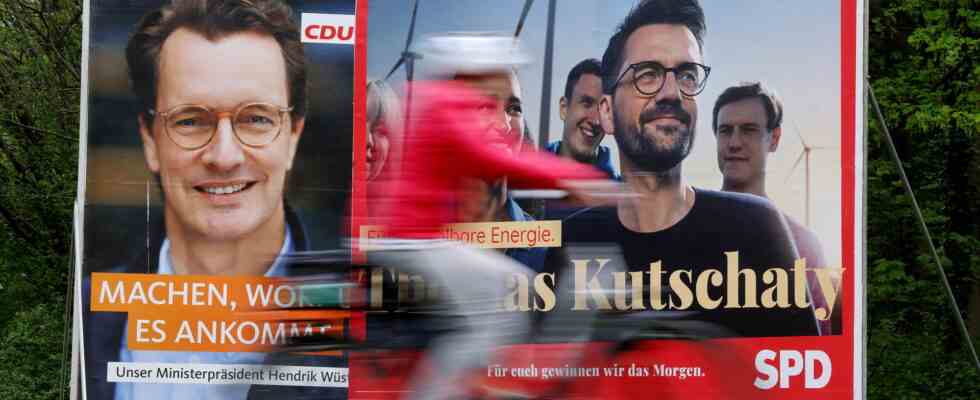Status: 05/14/2022 3:17 p.m
Two or three? With a known partner or try something new? The election in NRW promises to be exciting, and not just on Sunday evening. What alliances might be possible.
The pre-election polls for NRW see the CDU just ahead of the SPD, the Greens at an all-time high, the FDP weak but secure in the state parliament, the AfD as well, but the Left Party clearly below five percent.
With a view to the error tolerance of each survey and the uncertain number of postal voters, however, the outcome of the election is open – and more exciting than ever before in NRW. A wealth of coalition options is conceivable: from black-green to a grand coalition to traffic lights and Jamaica. Or is it even enough for red-green? Anyone who asks the leaders of the CDU, SPD, Greens and FDP will get evasive answers. No stipulations, except for one: no coalition with the AfD. But what is realistic in NRW?
The Greens could play a key role in forming a government – whether black-green, red-green, traffic lights or Jamaica, they play a central role in the most important simulation games. The party could end up being the kingmaker. If the Greens have the choice in a two-party alliance with roughly the same strong results for the CDU and SPD, then the more left-wing state association is more likely to opt for the familiar camp and govern again with the SPD.
However, if only black and green have a majority of two, then it would also be up to the negotiating skills of CDU man Hendrik Wüst to keep the Greens from participating in a traffic light. The conservative libertine could be agile and flexible enough to build this alliance. The biggest substantive sticking point in such a coalition would probably be internal security. Wüst has already announced that he intends to hold on to CDU Interior Minister Herbert Reul. A law-and-order man who, with his police law, tightened everything up that the constitution allowed. The Greens massively criticized this and at the same time showed that they have an experienced domestic politician in their co-group leader Verena Schäffer.
Black-green would be a novelty in NRW, for which the then CDU election winner Armin Laschet was open in the 2017 election. He would have liked to recommend himself with the Greens for new alliances in the federal government. But the Greens were punished so severely for their school policy in the election and the FDP gained so much that in the end it was just enough for black and yellow.
No Groko in Dusseldorf?
At the TV duel in WDR on Thursday, Prime Minister Wüst and his SPD challenger Thomas Kutschaty sometimes demonstrated so much unity that the debate seemed less like a duel and more like the sounding out for a grand coalition. But this option is probably only mathematically possible in NRW. Apparently, the parties are not seriously considering an alliance between the CDU and SPD. Also because neither the CDU nor the SPD should have an interest in making a name for themselves with yesterday’s coalition model.
A tripartite alliance in NRW?
The CDU and SPD are so close together in the pre-election polls that the tripartite alliances of traffic lights (SPD, Greens, FDP) or Jamaica (CDU, Greens, FDP) are also conceivable. It would be a paradigm shift for the most populous federal state. There has not been a three-party coalition here since 1958. So far, the decision in North Rhine-Westphalia has been more for a minority government than for three parties to join forces.
When CDU man Jürgen Rüttgers was voted out in 2010, Hannelore Kraft from the SPD explored the coalition options and ultimately formed a minority government with the Greens. For an astounding two years they passed bills, sometimes with the FDP and sometimes with the Left Party. Until an early general election returned the familiar red-green camp to a stable majority.
NRW used to set the pace for coalitions
Political scientist Martin Florack finds the current coalition dynamics in NRW “a bit anachronistic”. For many years there has been an intense debate about changing the party system and the need for cross-camp coalitions. But not in NRW. Here “the clocks stopped”.
NRW once set the pace for the federal government when it came to coalition options. Regardless of whether it was a social-liberal coalition in the 1960s or a red-green coalition – the blueprints for the federal government were often drawn up in NRW. Between 1995 and 2005, the SPD and the Greens in Düsseldorf struggled with a veritable government struggle – held together solely by the will to offer the federal government a coalition option. Successful: In 1998 the first red-green federal government was formed with Chancellor Gerhard Schröder.

